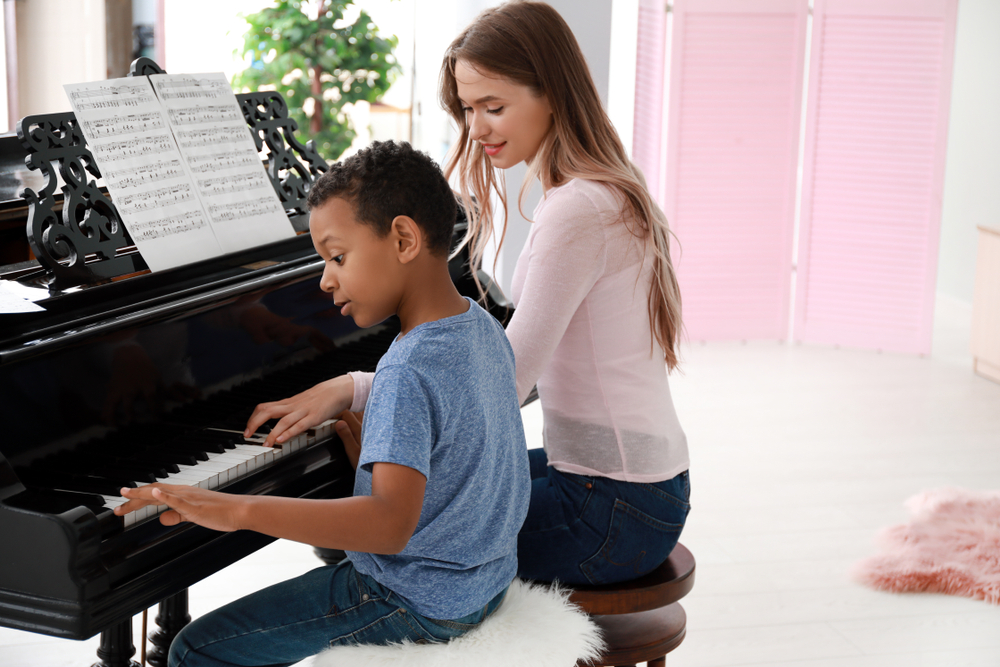The Incredible Benefits of Piano Lessons on the Human Brain
The Incredible Benefits of Piano Lessons on the Human Brain
Blog Article
Learning to play the piano is more than just acquiring a new skill or hobby; it is a transformative experience for the brain. Whether you’re a beginner or have years of experience, piano lessons offer remarkable cognitive, emotional, and physical benefits that can enhance brain function and overall well-being. In this blog, we’ll explore the many ways in which piano lessons improve brain health, touching on memory, concentration, creativity, and even emotional resilience.

1. Cognitive Development: A Mental Workout
When you take piano lessons, you’re actively engaging different regions of your brain simultaneously, giving it a full workout. One of the major cognitive benefits of playing the piano is improved memory. The brain learns to store and retrieve vast amounts of information—from musical notes and patterns to rhythms and timing. Playing piano also strengthens problem-solving abilities, as musicians are constantly making decisions regarding hand placement, timing, and interpretation.
Key Cognitive Benefits of Piano Lessons:
- Enhanced memory: Playing piano strengthens both short-term and long-term memory.
- Improved problem-solving: Musicians constantly analyze and solve musical challenges, honing logical thinking.
- Better attention span: Piano practice demands focused attention, leading to increased concentration and mental clarity.
- Improved multitasking: Playing piano involves reading music, coordinating hands, and listening simultaneously, enhancing multitasking abilities.
2. Boosting Brain Plasticity: The Power of Adaptability
One of the most impressive impacts of learning to play the piano is the increase in brain plasticity. Brain plasticity refers to the brain’s ability to reorganize itself by forming new neural connections. This is crucial not only in childhood development but throughout life, as it helps the brain adapt to new experiences and challenges.
Benefits of Brain Plasticity from Piano Lessons:
- Increased gray matter: Piano training leads to greater gray matter density, enhancing processing power.
- Language and math skills: Improved brain plasticity contributes to advanced language development and mathematical abilities.
- Age-related cognitive protection: Piano lessons can delay the onset of age-related cognitive decline, keeping the brain sharp into old age.
3. Emotional Regulation and Stress Relief
Life can be stressful, and one of the lesser-known benefits of piano lessons is how they help with emotional regulation. The act of playing the piano allows individuals to channel their emotions through music, providing a safe outlet for expression. Whether you’re playing a soothing ballad or a dynamic sonata, music has the power to calm the mind and elevate the mood.
In addition, piano lessons have been shown to reduce stress and anxiety. The focus required during practice can serve as a form of mindfulness, drawing attention away from worries and helping to reset the mind. Playing piano also promotes emotional intelligence, as it encourages students to interpret and express emotions through music.

Emotional Benefits of Piano Lessons:
- Stress reduction: The immersive nature of piano playing provides an effective way to unwind and relieve stress.
- Emotional expression: Music allows for emotional exploration and helps in processing complex feelings.
- Boosted mood: Playing your favorite pieces can release dopamine, improving overall emotional well-being.
- Improved self-confidence: Accomplishing musical goals—such as mastering a difficult piece—can lead to greater self-esteem.
4. Improved Motor Skills and Coordination
While learning to play the piano is a mental exercise, it also improves physical abilities, particularly fine motor skills. The coordination required to play the piano, especially when using both hands simultaneously, helps to improve dexterity and motor control. This benefit is not limited to children; adults and older individuals can also see improvements in their hand-eye coordination through regular practice.
Motor Skills and Physical Benefits:
- Enhanced dexterity: Playing piano strengthens finger muscles and improves hand flexibility.
- Improved hand-eye coordination: Reading music while playing builds stronger connections between visual cues and hand movements.
- Bilateral coordination: Using both hands independently trains the brain to manage complex motor tasks.
- Fine motor skills development: Piano lessons help children and adults alike improve precision and control in their hand movements.
5. Creativity and Imagination: Fueling Innovation
Piano lessons go beyond rote memorization and technical skill—they also unlock creativity. Music is a powerful medium for self-expression, and learning to play piano gives students the freedom to explore different styles and interpretations. Advanced students often experiment with improvisation and composition, both of which foster creative thinking.
Even when playing pre-composed pieces, pianists can infuse their personal touch into the performance.
Creative Benefits of Piano Lessons:
- Improved creative thinking: Playing the piano stimulates the right side of the brain, boosting creativity and imagination.
- Personal expression: Musicians can express unique interpretations through their performances.
- Improvisation and composition: Encourages students to think outside the box and explore new musical ideas.
- Cross-disciplinary innovation: Enhanced creativity can lead to improvements in other fields, such as visual arts, writing, or business problem-solving.
6. Social Connections and Teamwork
Although piano is often seen as a solitary pursuit, it also offers numerous social benefits. Many piano students participate in recitals, group lessons, or competitions, which provide opportunities to connect with other musicians.
Social and Interpersonal Benefits of Piano Lessons:
- Public performance skills: Performing at recitals boosts confidence and public speaking abilities.
- Collaboration and teamwork: Group lessons and duets help foster teamwork and social interaction.
- Community building: Joining a musical community offers support, encouragement, and a shared passion for music.
- Discipline and patience: Working with an instructor and peers teaches students the value of perseverance and respect.
Why Piano Lessons are Essential for Brain Health
The benefits of piano lessons extend far beyond learning to play beautiful music. From cognitive enhancement and improved motor skills to emotional regulation and increased creativity, learning to play the piano offers a wealth of advantages that nourish the human brain. Search "piano lessons edmonton" on Google to find out nearby piano teaching institutes near you.
Report this page